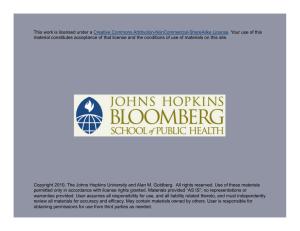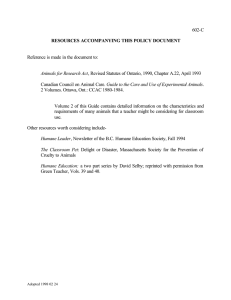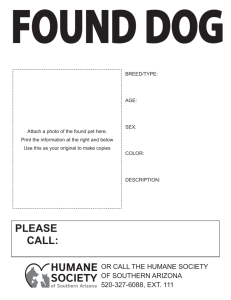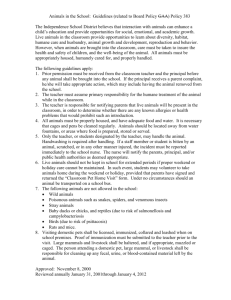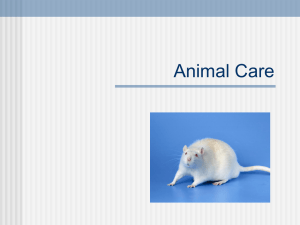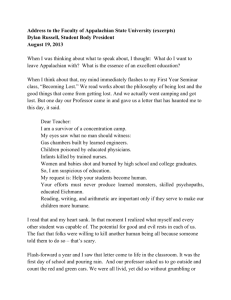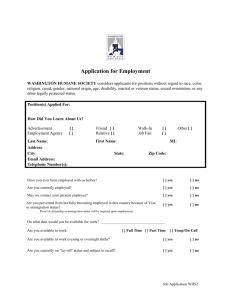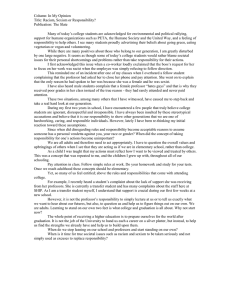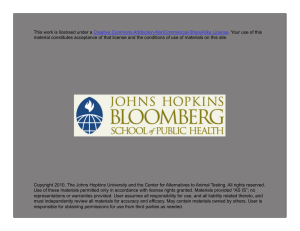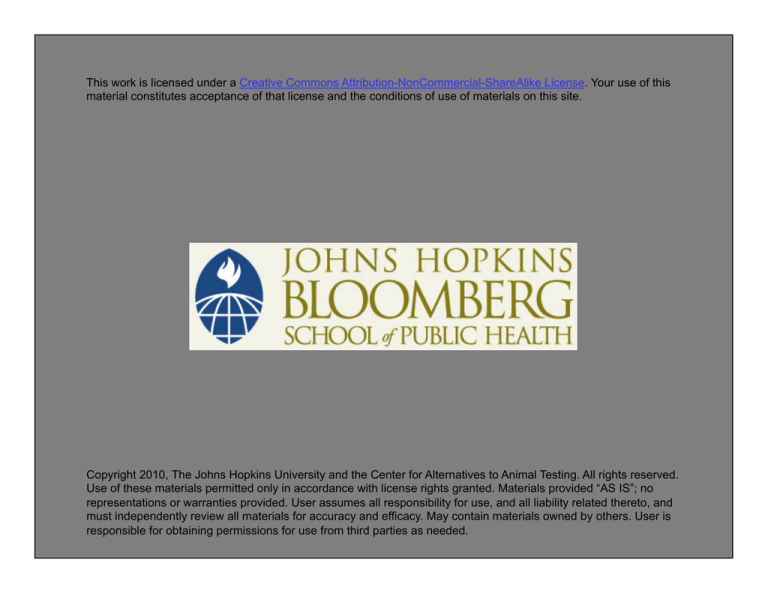
This work is licensed under a Creative Commons Attribution-NonCommercial-ShareAlike License. Your use of this
material constitutes acceptance of that license and the conditions of use of materials on this site.
Copyright 2010, The Johns Hopkins University and the Center for Alternatives to Animal Testing. All rights reserved.
Use of these materials permitted only in accordance with license rights granted. Materials provided “AS IS”; no
representations or warranties provided. User assumes all responsibility for use, and all liability related thereto, and
must independently review all materials for accuracy and efficacy. May contain materials owned by others. User is
responsible for obtaining permissions for use from third parties as needed.
Enhancing Human Science: Improving
Animal Research
Alan M. Goldberg, PhD, Johns Hopkins Bloomberg School
of Public Health
James Owiny, BVM, PhD, Dip, ACLAM, Training and
Compliance Administrator, Animal Care and Use
Committee, Johns Hopkins University
Learning Objectives
This course will:
- Provide you the tools to practice the most humane science
- Demonstrate that humane science is also the best science
3
Lectures
The lectures in this course each take 20-30 minutes. Most lectures
have several slides with additional resources and study questions
identified.
4
Feedback
This is the first generation of material presented. Feedback is
requested.
- Alan M. Goldberg – goldberg@jhsph.edu
- James Owiny – jowiny@jhmi.edu
5
Discussion Groups
Discussion groups will follow the self-paced material.
We request that you attend at least one session, but you are invited
to attend as many sessions as you wish.
6
A Prerequisite
“The humanest possible treatment of experimental animals, far
from being an obstacle (to biomedical research), is actually a
prerequisite for successful animal experiments.”
The Principles of Humane Experimental Techniques
W.M.S. Russell and R.L. Burch
7
Some Examples
Using the wrong experimental design wastes resources, your time,
and animal lives
Enrichment addresses the question when is enrichment not
appropriate
Humane endpoints allow achievement of experimental objectives
while minimizing pain, distress, and discomfort to animals
8
The 3 Rs
This course, based on the 3 Rs – replacement, reduction, and
refinement (see next slide), will change the way you practice the
most fundamental aspects of your approach to research with
animals. It will enhance the quality of your contributions to the
literature and to the science you produce.
9
The 3 Rs
A replacement alternative is one that eliminates the need for
whole-animal testing.
A reduction alternative decreases the number of whole animals
necessary to perform a particular test or group of tests.
Refinement alternatives are those that improve the design and/or
efficiency of the test and results in decreasing or possibly in
eliminating distress or pain experienced by laboratory animals.
10
The 3 Rs
Humane Science will become one of the many tools (just like chemistry
or biology) that you as a scientist need to practice your research
career. Enjoy.
11
One of Many Tools
Humane Science will become one of the many tools (just like chemistry
or biology) that you as a scientist need to practice your research
career. Enjoy.
12
Table of Contents
Week
Title
Speaker
1
Opening
Goldberg/Owiny
2
Introduction to Humane Science, Informed Decisions,
Responsible Use of Animals, Ethics, Pain, Distress,
Suffering
Rowan/Goldberg
3
Rodent Surgery – Quality Matters
Brown
4
Postoperative and Postprocedural Care
Singletary/Newcomber
5
Measurement, Relief (Prevention) of Pain and Distress
Peterson
6
Impact of Stress on Quality of Data
Rowan
7
Humane Endpoints
Owiny
8
Welfare, the 5 Freedoms, Housing
Watson
9
Enrichment
Guilarte
10
Noninvasive Techniques
Gabrielson
11
In Vitro and Other Replacement Approaches
Goldberg/Yager
12
Experimental Design/Statistical Concepts/Role of Pilot
Studies
Broman
13
Abbreviations
ASPCA – American Society for the Prevention of Cruelty to Animals
ASPET – American Society for Pharmacology and Experimental Therapeutics
AV – antivivisection
AWA – Animal Welfare Act
CI – confidence interval
CNS – central nervous system
CPU – central processing unit
CT – Computer-assisted tomography
CV – cardiovascular
DA-System – dopaminergic system
ECVAM – European Center for the Validation of Alternative Methods
ED50 – Effective Dose – 50%
EU – European Union
FASEB – Federation of American Societies for Experimental Biology
FDG – fluorodeoxyglucose
FFA – free fatty acids
HCG – human chorionic gonadotropin
HSUS – Humane Society of the United States
14
Abbreviations
IACUC – Institutional Animal Care and Use Committees
IASP – International Association for the Study of Pain
ICCVAM – Interagency Coordinating Committee on the Validation of
Alternative Methods
IM – intramuscular
IP – intraperitoneal
IV – intravenous
LPS – lipopolysaccharide
LV – left ventricle
MI – myocardial infarction
MMTV – mouse mammary tumor virus
MRI – magnetic resonance imaging
MSPCA – Massachusetts Society for the Prevention of Cruelty to Animals
NAVS – National Anti-Vivisection Society
NMR – nuclear magnetic resonance
NHP – non-human primates
NSAID – non-steroidal antiinflammatory drugs
OECD – Organization for Cooperation and Economic Development
P&D – pain & distress
PBS – phosphate-buffered solution
15
Abbreviations
PET – positron emission tomography
PETA – People for the Ethical Treatment of Animals
RTE – reconstituted tissue equivalents
SAR – structure activity relationships
SAV – scientific anti-vivisection
SC – subcutaneous
SE – staphylococcal enterotoxins
SEM – standard error of the mean
SOT – Society of Toxicology
TBE – tribromoethanol
TLC – tender loving care
UK – United Kingdom
UCCAA – University of California Center for Animal Alternatives
USA – United States of America
USDA – United States Department of Agriculture
16
Contact Information
Any concerns about animal care, use, or abuse, please contact any of the
following individuals:
- Christian Newcomer (newcom4@jhmi.edu)
- Chi Dang (cvdang@jhmi.edu)
- Gary Ostrander (gko@jhu.edu)
- Any member of the Institution Animal Care & Use Committee (IACUC)
17

